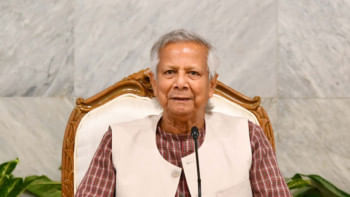BNP leaders’ money in Swiss banks
Prime Minister Sheikh Hasina yesterday hinted that BNP leaders deposited money in Swiss banks, which was collected through nomination business ahead of the December 30 national election.
“There is information that the BNP nominated 692 candidates in 300 seats in the December 30 election. More than two candidates were nominated for each con-stituency,” the PM told parliament.
Responding to a proposal by BNP lawmaker Rumeen Farhana for eliciting public opinion on the finance bill, Hasina said, “Where did they deposit the money collected from nomination business? You will get an idea from the statistics of Swiss bank accounts if you look into the matter.”
The PM made the reply on behalf of ailing Finance Minister AHM Mustafa Kamal. She also had placed the Finance Bill, 2019 in the House.
Earlier, the finance minister sought Speaker Shirin Sharmin Chaudhury’s permis-sion to allow the PM to respond to lawmakers’ proposals on eliciting public opin-ion on the finance bill and other amendments to the bill.
Hasina’s comments came at a
time when deposits in Swiss banks by Bangla-deshis increased by 28.33 percent year-on-year to 617.72 million Swiss francs or Tk 5,341 crore in 2018, according to the Swiss National Bank (SNB).
Experts said the deposits increased amid uncertainties over the parliamentary election held in December last year.
The SNB revealed the data in its annual report, titled “Banks in Switzerland 2018”. However, the report, published on June 27, did not shed any light on the alleged black money held by Bangladeshis.
Speaking on her proposal, lawmaker Rumeen, elected to BNP’s reserved seat for women, said the proposed budget was not a pro-people one as it aimed at making rich people richer and poor people poorer.
She also mentioned that Bangladeshis’ deposits in Swiss banks increased a lot in recent times.
Pointing to the lawmakers’ criticism over the government’s failure to control loan default culture, Hasina said military dictator Ziaur Rahman had started the cul-ture after grabbing state power and introducing military rule in the country.
“Zia had grabbed state power violating the military rule following the assassina-tion of Father of the Nation Bangabandhu Sheikh Mujibur Rahman in 1975. Dur-ing the formation of a political party, Zia had taken loan from banks desperately to give benefits to some people and the loan default culture began from that time,” the PM alleged.
She said the culture would have ended had a democratic government remained in power continuously. “We have already taken some measures and also taking steps now to end the loan default culture.”
On the proposal of keeping a provision to whiten black money, the PM said her government would certainly take measures if corruption increased through this provision.
GENERAL DISCUSSION ON BUDGET
Earlier, winding up the general discussion on the proposed national budget for fiscal 2019-20, Hasina described the budget as people-friendly, development-oriented and a balanced one.
She said everyone would get benefit from the budget as it would help continue the pace of the ongoing development projects.
Bangladesh has set a target of achieving 8.20 percent GDP growth in FY 2019-20 and a double-digit growth in the FY 2023-2024, the Leader of the House said.
Hasina said the government has achieved the success of upgrading Bangladesh into a middle-income country by successfully implementing the “Vision 2021” and it is heading forward to achieve the Sustainable Development Goals (SDGs) by 2030 and build a developed country by 2041.
The proposed budget would act as an effective tool to achieve the goals and im-plement the Awami League’s election manifesto, she added.

 For all latest news, follow The Daily Star's Google News channel.
For all latest news, follow The Daily Star's Google News channel. 



Comments